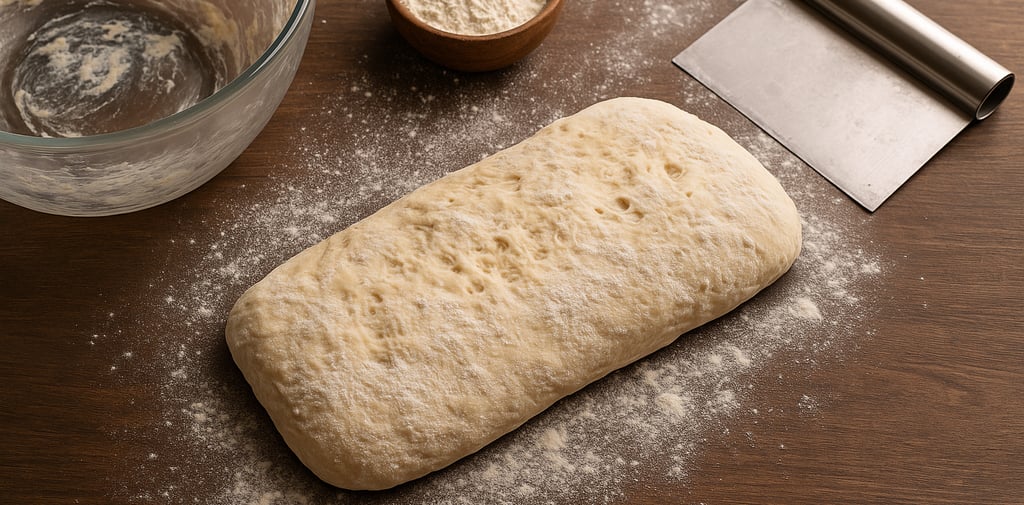The Ciabatta of the Persecuted
Jean, the baker, finds in rustic ciabatta a symbol of those persecuted for righteousness-crushed yet rising, bearing the Kingdom's true flavor.
BEATITUDES
Wandering Armenian
8/28/20256 min read


The Ciabatta of the Persecuted
Jean Baptiste's fingers trembled as they sank into the wet, uncooperative ciabatta dough. It stuck to everything—his palms, the counter, even his wedding ring, the one Marie had slipped onto his finger thirty-seven years ago before cancer stole her voice, then her breath, then her presence from this little bakery they had built together
"Why does it have to be so difficult?" he whispered to the empty room, though he was not sure if he meant the bread or his life.
The morning sun slanted through the windows Marie had insisted on keeping spotless, casting golden rectangles across flour that hung in the air like tiny prayers. Jean's chest tightened. Some mornings, the silence felt like a weight pressing down on his ribs, making each breath deliberate. He stared at the shapeless mass before him. Ciabatta—Italian for "slipper." Even the name suggested something worn out, cast aside, forgotten. Just like he felt most days since the town had turned against him.
It started small, as these things do. A raised eyebrow when he gave away day-old bread to the homeless shelter instead of selling it marked down. Whispered conversations stopped when he entered the grocery store. Then came the anonymous note shoved under his door: "Real businesses don't give handouts to lazy people."
Jean's hands stilled in the dough as the memory hit fresh as a slap. His voice cracked as he spoke to the empty bakery: "All I did was try to love like You taught us to love."
The dough mocked him with its stubbornness, clinging and stretching but refusing to cooperate. Jean wiped his eyes with the back of his wrist, leaving a streak of flour across his cheek. Marie would have laughed at that, would have dabbed it clean with her apron corner while humming something off-key and beautiful.
Setting the mess aside to rest, Jean reached for his Bible with flour-caked fingers. The pages fell open to Matthew 5-they always seemed to open there lately, as if the book knew what his heart needed to hear. His eyes found verse ten, and he read aloud, his voice barely above a whisper: "Blessed are those who are persecuted because of righteousness, for theirs is the kingdom of heaven."
Persecuted. The word sat heavy in his mouth. Jean thought of Maria Santos, the young mother who had lost her job at the bank for refusing to work Sundays so she could teach children's church. He had watched her count out exact change for a single loaf of bread, her toddler clinging to her leg, both wearing that look of worry that comes when you are not sure where the next meal will come from.
There was old Pietro, whose son would not speak to him anymore, whose grandchildren had been forbidden from visiting ever since he had started attending Mass again after forty years away. Jean had seen him sitting alone in the back pew, shoulders shaking with silent tears during communion.
And Sarah, sweet sixteen-year-old Sarah, who had been eating lunch by herself for three months now because she had stood up to the popular kids when they were bullying the new refugee student. Jean had overheard her mother in the post office, voice tight with worry: "She's so lonely, but she won't back down. Says Jesus would sit with the outcasts."
Jean's own throat was constricted. He knew that kind of loneliness, the way it settled in your bones like winter cold. Since Marie died, since he had started giving away bread, since he had begun closing on Sundays despite the lost revenue, the isolation had grown thick around him. Old friends crossed the street to avoid conversation. Former customers shopped at the new chain store outside town. Even his own nephew had stopped calling.
Some nights, lying in the bed that felt too big without Marie's gentle snoring, Jean would stare at the ceiling and wonder if following Jesus was supposed to hurt this much. If righteousness was supposed to feel so much like failure. Returning to his dough, Jean began the folding process. His movements were automatic now after forty years of bread-making, but today each fold felt intentional, almost sacred. He lifted one edge of the sticky mass and stretched it over itself, feeling the resistance, the way it wanted to tear apart under pressure.
"Just like us," he said, and his voice cracked on the words. A tear dropped onto the counter, mixing with the flour. "We get stretched until we think we can't hold together anymore."
But something was happening under his hands. With each fold, the dough was changing. Where it had been slack and formless, structure was emerging. Jean could feel it developing strength, creating the network of bubbles that would make ciabatta unique-not smooth and perfect like other breads, but full of irregular holes and spaces.
Jean paused, his floury hands suspended over the dough, understanding beginning to dawn like sunrise. The persecution, the stretching, the pressure-it was not random cruelty. It was transformation.
He thought of Maria, how her trials had carved out a fierce compassion in her. She had started a support group for struggling mothers, her own pain becoming a bridge to others' healing. Pietro had begun visiting the nursing home, his loneliness transforming into a presence for other forgotten souls. And Sarah-fearless Sarah was planning to study social work, her teenage suffering already shaping her into an advocate for the voiceless. The timer chimed, startling Jean from his thoughts. Time for the oven.
As he slid the shaped loaves into the blazing heat, Jean felt the temperature hit his face like a physical force. This was the moment that would make or break the bread—literally. The intense heat would blister the crust, creating that rustic, scarred exterior that made ciabatta so distinctive. But inside, protected by that tough skin, the crumb would remain tender, full of beautiful spaces where light could shine through.
Jean leaned against the oven door, watching through the window as his bread transformed. His own heart felt blistered too, scarred by the heat of others' judgment and rejection. But maybe—just maybe—that rough exterior was protecting something precious inside. The spaces carved out by suffering were exactly where God's Kingdom could assume residence.
Forty-five minutes later, the bakery filled with the sound of crackling crust as Jean pulled the golden loaves from the oven. His hands shook as he lifted them-not from weakness, but from recognition. The crust was beautifully imperfect, bearing the gorgeous scars of intense heat, rustic and bold and real.
With trembling fingers, he broke open a loaf. The sound was like a whisper of hope. Inside, countless irregular holes caught the morning light, creating a landscape of tiny windows. Jean's vision blurred, but this time with tears of wonder.
"Windows," he breathed, his voice thick with emotion. "Windows for Your light to shine through."
Each hole told a story—of pressure endured, of being stretched beyond comfort, of heat that could have destroyed but instead created something beautiful. The persecution, the loneliness, the nights of wondering if he were a fool—all of it had hollowed out spaces in his heart where God's Kingdom could dwell.
Jean carefully wrapped an extra loaf in brown paper, his mind turning to David, the Syrian refugee living in the apartment complex two blocks away. David had fled his homeland for refusing to renounce his faith, arriving with nothing but a backpack and unshakeable trust in Jesus. The man's eyes held that depth that comes only from suffering surrendered to the Savior.
As Jean walked through the quiet morning streets, the warm bread cradled against his chest, his heart swelled with something he had not felt in months—joy. Not the shallow happiness that comes from good circumstances, but the deep, abiding joy that arises from understanding your purpose in the Kingdom.
David would understand this bread. He would taste not just wheat, water, and salt, but the flavor of resilience, the seasoning of hope, the richness that only comes from being refined in the furnace of faithfulness. Standing at David's door, Jean looked down at the loaf in his hands—crusty and scarred on the outside, tender and light-filled within. He thought of Jesus' promise, and this time when he spoke it aloud, his voice was strong: "Blessed are those who are persecuted because of righteousness, for theirs is the kingdom of heaven."
The words tasted as real as the golden crust in his hands. The Kingdom was not just a future hope-it was present now, in every hole of this humble bread, in every space carved out by suffering surrendered to the Savior. It was in Maria's support group, Pietro's nursing home visits, Sarah's brave compassion, David's unshakeable faith. And yes, it was in his own small bakery, in day-old bread given freely on Sundays spent worshipping instead of working, in the beautiful, breaking hope that persecution could be transformed into something that nourished both body and soul.
Jean knocked on David's door, eager to share not just bread, but the truth he had discovered in his morning's work: the most beautiful bread always bore the marks of fire—and so did the most beautiful saints. After all, it was the broken places that let the light shine through.

